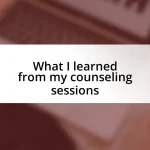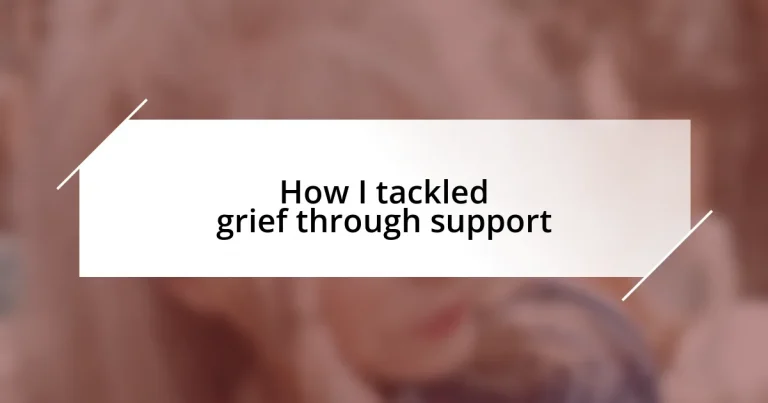Key takeaways:
- Grief is a personal journey, but sharing feelings with others can lighten the burden and create a sense of connection.
- Support can come from various sources such as support groups, professional counseling, and self-care practices, which foster healing and understanding.
- Building a support network, including community events and online groups, can provide encouragement and a sense of belonging during difficult times.
- Rituals, like lighting candles and creating memory boxes, help keep memories alive and transform grief into moments of remembrance and joy.
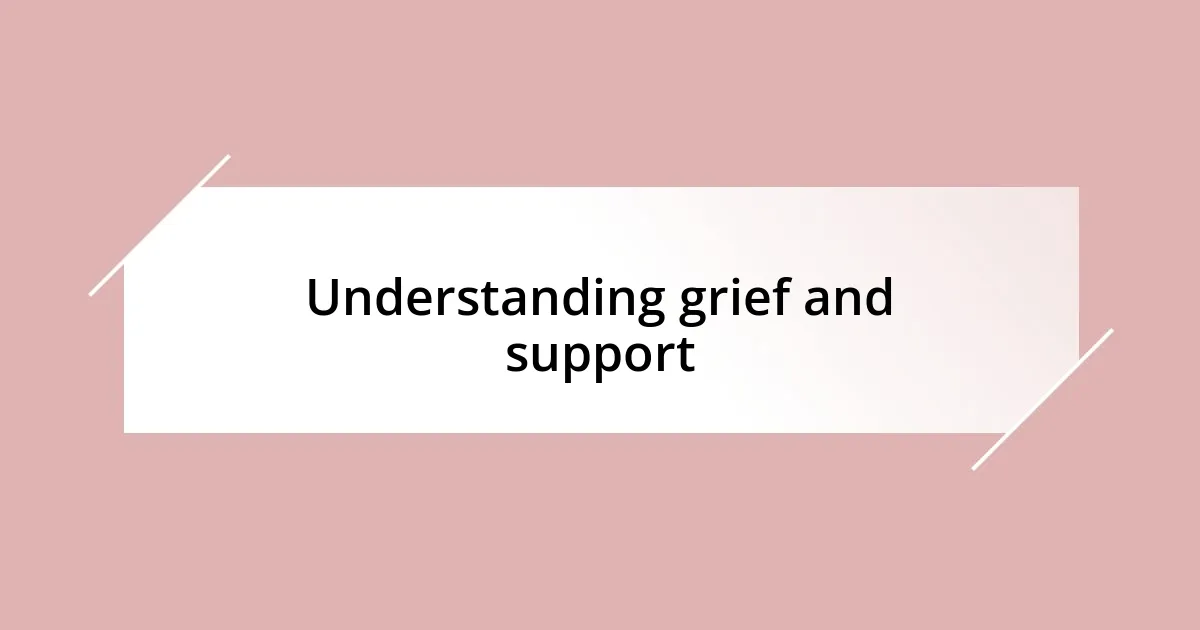
Understanding grief and support
Grief is an intricate and deeply personal experience, often leaving us feeling isolated in our pain. I remember the day I lost my close friend; it felt as if a heavy fog settled over my mind, drowning out everything else. Why is it that we sometimes become locked in our own sorrow while the world continues to spin around us?
Support can come in many forms, from friends and family to professional counseling. I found that simply sharing my feelings with a friend who had also experienced loss created a profound bond. Have you ever noticed how talking openly can lighten the burden, even just a little? Those moments of connection made me realize that grief doesn’t have to be faced alone.
Sometimes, it’s a simple gesture of kindness that can be the most impactful. I recall a time when a colleague brought me coffee just because they sensed I needed a friend. In that moment, I felt seen and supported, which reminded me that compassion can be the light in someone’s darkest hour. Isn’t it fascinating how even small acts can resonate so deeply when we’re navigating grief?
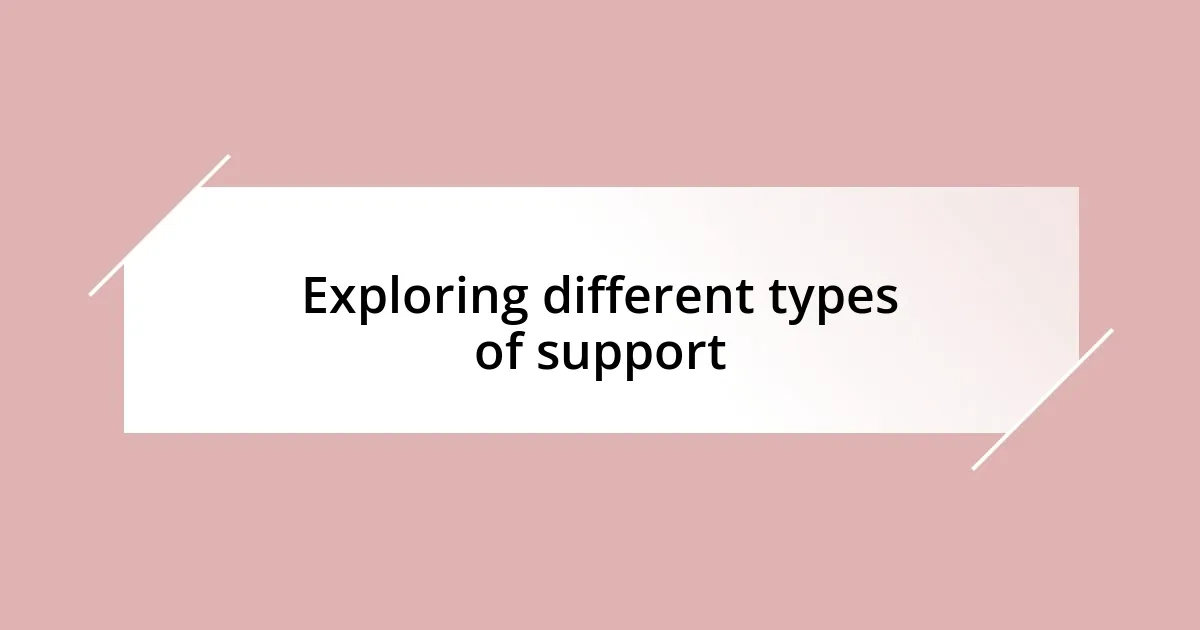
Exploring different types of support
Support takes on many shapes, each catering to different emotional needs. For me, one of the most comforting forms was a support group I joined. Sitting in a circle with others who shared my grief was unexpectedly healing. We laughed, cried, and shared stories that echoed our feelings. Did you ever find solace in a gathering of like-minded souls? It’s incredible how knowing others understand your pain can lighten the load.
Professional counseling also offers a unique perspective. I vividly remember the first time I opened up to a therapist. It felt strange to talk to a stranger about my loss, but the tools they provided helped me navigate my emotions more effectively. Have you ever tried seeking professional help? Sometimes we need that external guidance to venture through our grief safely and productively.
Lastly, the role of self-care should not be overlooked. I started a journaling practice during my grieving process, allowing my thoughts to flow freely onto the pages. Noticing my feelings evolve over time was a powerful revelation. What methods have you used to foster self-compassion in difficult times? Discovering practices like this can be a supportive act of kindness towards oneself.
| Type of Support | Description |
|---|---|
| Support Groups | Shared experiences create a sense of community and understanding. |
| Professional Counseling | Expert guidance to help navigate emotions and grief. |
| Self-Care Practices | Personal methods like journaling that foster self-compassion and healing. |

Seeking professional help for grief
Seeking professional help for grief can feel like a daunting step, but I found it to be one of the most transformative choices I made during my journey. I remember sitting in that therapist’s office, the air thick with unspoken feelings. It surprised me how quickly I began to unravel emotions I had tucked away. It was a safe space that allowed me to express my grief without judgment. Have you ever felt the weight of unshared pain lift after confiding in someone trained to listen?
- Different Approaches: Therapists often use various methods, from cognitive behavioral therapy to mindfulness practices, helping tailor the healing process to individual needs.
- Clarity and Perspective: Talking with a professional can offer insights that aren’t easily recognized in day-to-day life, bringing clarity to the emotional turmoil.
- Accountability: Regular sessions create a structure that encourages you to confront feelings, allowing for a more profound processing of grief.
During my sessions, I learned practical coping strategies that transformed my perspective on grief. I still remember when my therapist introduced me to grounding exercises. At first, I thought they were a bit silly, but the first time I tried one during a particularly overwhelming moment, it was like stepping outside into fresh air after being in a stuffy room. Have you experienced a breakthrough like that when trying new techniques? The journey of grief is uniquely challenging, but professional help can genuinely illuminate the path forward.
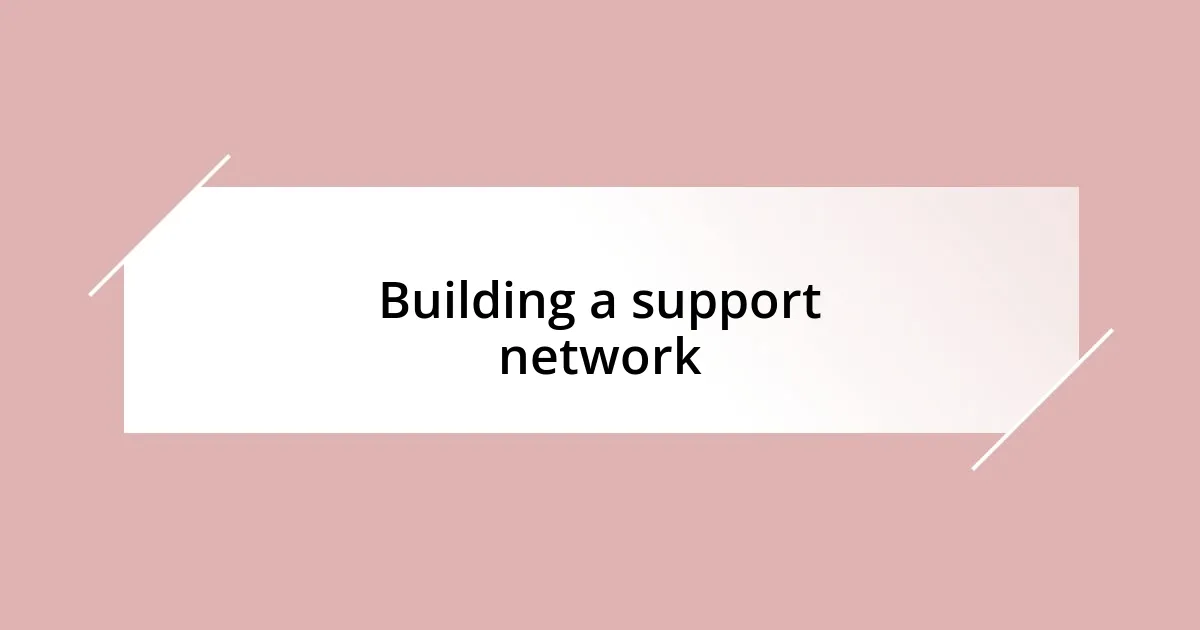
Building a support network
Building a support network during my grieving process was like constructing a safety net, intricately woven with relationships that offered strength and comfort. I reached out to friends and family, sharing my feelings openly about the loss I faced. Their presence became a beacon of hope, reminding me that I wasn’t alone in this daunting journey. Have you ever felt that warmth when someone simply listens? It truly makes a difference.
I also discovered the power of community events surrounding grief. I remember attending a candlelight vigil organized by a local support group. There, I met others with similar stories, all of us gathering to honor our loved ones while sharing in the collective pain. The realization that while our paths might be different, our hearts echoed the same sadness was profoundly comforting. Have you ever participated in an event that connected you to others in unexpected ways?
To enhance my support network even further, I leveraged social media platforms to find online grief communities. I felt shy at first, but when I posted about my journey, an outpouring of support followed. Conversations began, and I became part of a digital family that offered advice, shared experiences, and simply provided a virtual shoulder to lean on. Have you ever found a connection in the most unlikely of places? Sometimes, just knowing that you can reach out to someone anytime can be a lifeline.
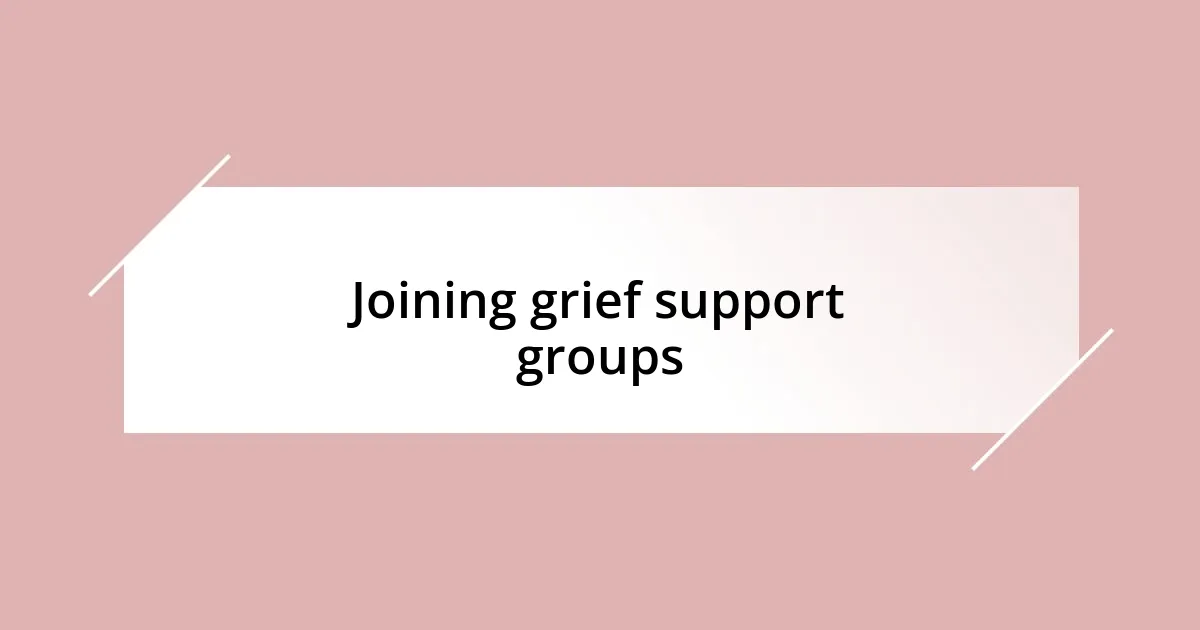
Joining grief support groups
Joining a grief support group was a pivotal moment in my healing journey. I still recall the nerves coiling in my stomach as I walked into that dimly lit room, unsure of what to expect. Yet, as I sat with others who understood the depths of my pain, there was an unspoken bond that wrapped around us all. Have you ever felt that moment when a room full of strangers suddenly feels like family? It was in those shared stories that I found a sense of belonging.
One night, we were encouraged to write letters to our loved ones, expressing thoughts we never had the chance to share. The emotions poured out of me onto the page, tears flowing freely. After reading my letter aloud, I saw tears shimmering in the eyes of others, and it struck me—the power of vulnerability creates a space for others to feel safe. Isn’t it fascinating how sharing our deepest wounds can forge connections with others who are also navigating grief?
Grief support groups also provided valuable coping tools, often through guest speakers or workshops. I remember a session focused on mindfulness, where we practiced breathing techniques together. At first, I felt a bit skeptical, but the calmness that enveloped the group was palpable. I realized how vital it is to have a safe space where we can learn and grow together. Have you ever discovered something unexpected in a group setting that changed your perspective? My experience in that room was a testament to the healing power of community during the toughest times.
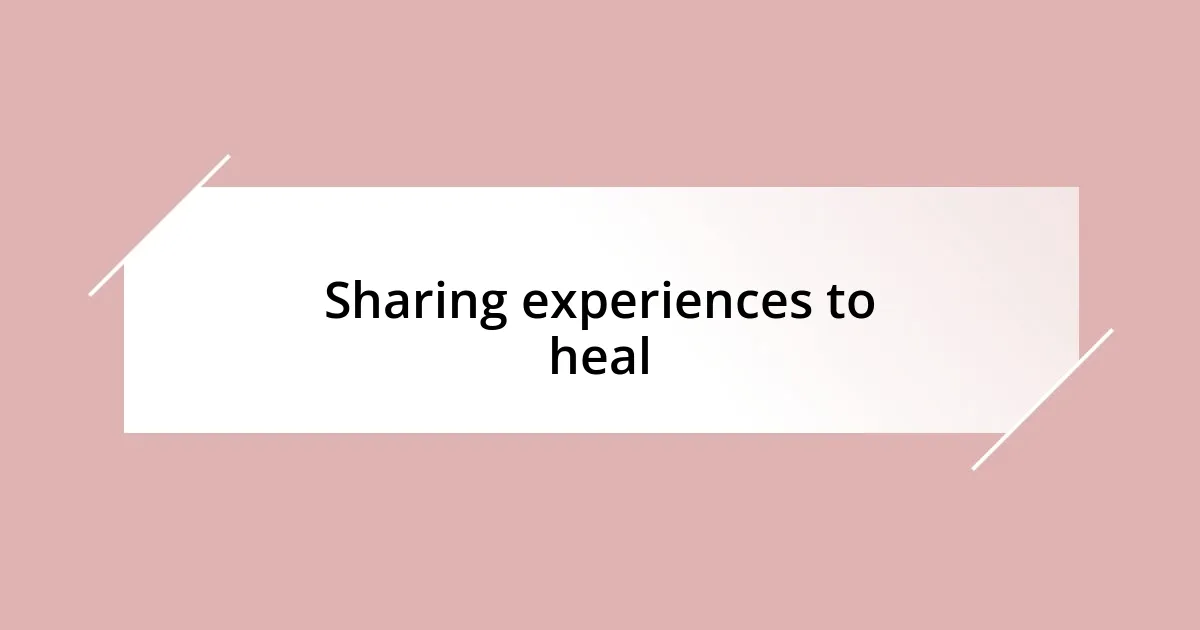
Sharing experiences to heal
Sharing experiences can be one of the most powerful tools in the healing process. I remember a particularly poignant moment during a small gathering where we each took turns sharing stories about our loved ones. Hearing everyone else’s experiences made my own grief feel less isolating. Have you ever noticed how talking about your feelings can somehow lighten the emotional load? For me, it shifted my perspective from feeling burdened to finding solace in shared understanding.
There was a day when a fellow attendee at a grief support meeting opened up about their struggle with memories that haunted them. Listening deeply to their tale stirred something within me. I found the courage to discuss my own memories, expressing both joy and sorrow tied to the same moments. It felt liberating to let those feelings out, and it was evident in the collective nods of agreement around the room. How incredible it is to realize that in our vulnerability, we are not only seen but also embraced!
In some instances, sharing isn’t confined to structured meetings. I found that my closest friends had stories of their own that echoed my pain. Once, during an enveloping conversation over coffee, we each shared our similar encounters with loss, accompanied by laughter and tears. That mix of emotions created an atmosphere of healing—it allowed us to acknowledge the shadows of grief while also celebrating life. Have you ever had conversations that spiraled into catharsis? It’s in those moments that I truly felt the healing impact of shared experiences.
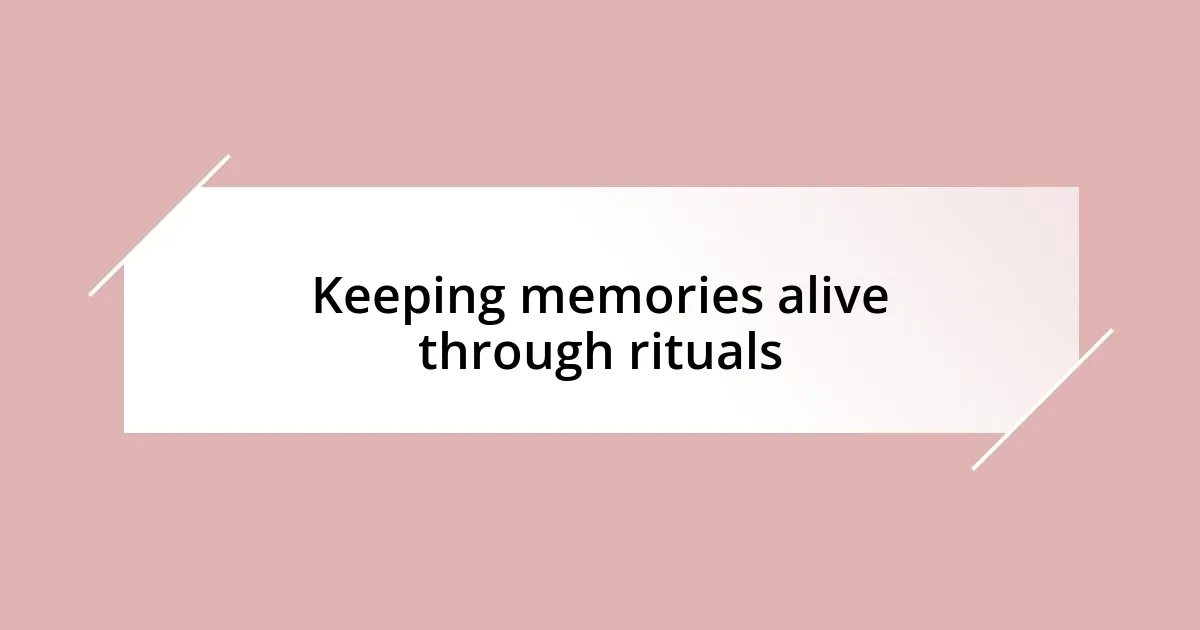
Keeping memories alive through rituals
Rituals can be a powerful way to keep memories alive. I remember the first time I lit a candle in remembrance of my loved one. As the flame flickered, it felt like a bridge connecting the past and present, illuminating the cherished moments we shared. Have you ever found solace in a simple act that brought back a flood of memories? It’s amazing how these small gestures can evoke such profound emotions.
Another ritual I embraced was creating a memory box. I gathered items that held significance—photos, letters, and mementos that told our story. Each piece felt like a thread, weaving together a tapestry of our experiences. As I sat down to reflect while going through the box, it was almost like having a conversation with them again. Have you ever turned to physical reminders to spark memories? I find that engaging with these objects allows me to celebrate their presence in my life, even if they are no longer physically with us.
On certain anniversaries, I started hosting gatherings with close friends, where we share stories and laughter about the person we lost. Once, we prepared their favorite meal and gathered around the table, the air tinged with nostalgia. It struck me that those moments of collective remembrance can transform grief into joy. Don’t you find that reliving happy memories can help ease the heaviness of loss? My heart swelled with gratitude for those who understood the importance of keeping their spirit alive in our lives through ritual and remembrance.






